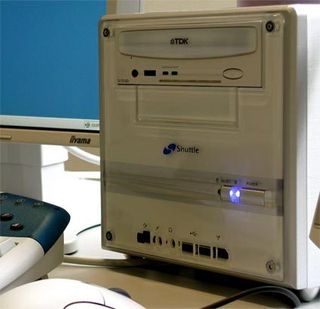Goodbye to Hulking PCs: Athlon Mini-PCs Set The Trend
The mini-PC improves the ergonomics at the workplace.
Conclusion: Mini-PCs For Everyone -Traditional Tower-PC Are Bound For Extinction!
For the first time, we received a compact mini-PC that is convincing on nearly all fronts. The barebones system SS40 from Shuttle is factory-equipped with a cool looking aluminum case that houses a Flex-ATX motherboard and a capable power supply, as well as a heat pipe system for cooling the CPU. Considering its small dimensions (the PC takes up less than a third of the volume of standard PCs), the features that it offers are quite persuasive. All of the important components, such as graphics, sound, network and FireWire (IEEE1394), are integrated on the motherboard. So, what's the point in buying yet another big, bulky beast of a PC tower when you can have something more compact and ergonomic? Compared to the bargain-basement PCs, the Shuttle system reveals good workmanship and high-quality materials. For the majority of users, a PC configuration like the one we used in this test is enough to take on all the necessary tasks. The only limitations are with 3D games: here, the graphics are a bit too weak. . However, the manufacturer plans to come out with a version complete with AGP slot soon. Together with an AMD Athlon XP 1900+ and 512 MB DDR266 (CL2), the mini-system attained high performance levels. The key to the Shuttle system is the integrated heat pipe for the CPU: the rotation speed of the finely-tuned fan is dependent on the CPU temperature. . In practice, the computer works very quietly - which is not to be taken lightly when a heat generator like the AMD Athlon is in use. If you prefer Intel CPUs, there will also be a version for the Pentium 4, to come out shortly.

The question on our minds is: why should outmoded form factors, together with low integration density, be the dominant format on the PC market? For those of us who already have a standard PC system, switching over to a mini-PC will feel like true progress. Compact dimensions, light weight, good performance, all-around capabilities and a low noise level make the no-name bargain-basement PCs seem old and out of date.
Our message to OEM manufacturers and PC makers is clear: the mini-PC offers a good chance at stimulating a weak market . If you continue relying on the aging concept of clunky tower PCs plus ATX components, you won't survive the long haul. The mini-PC has lots of potential, as shown by our test of the Shuttle system. Its only weakness is the current price, which is currently about $370. Users geared towards low-cost systems won't be accustomed to this price class. If you're not on a tight budget and are looking for an ergonomic solution, you'll be well-advised to go for a mini PC.
Stay On the Cutting Edge: Get the Tom's Hardware Newsletter
Get Tom's Hardware's best news and in-depth reviews, straight to your inbox.
Current page: The mini-PC improves the ergonomics at the workplace.
Prev Page How The Heat Pipe WorksMost Popular

